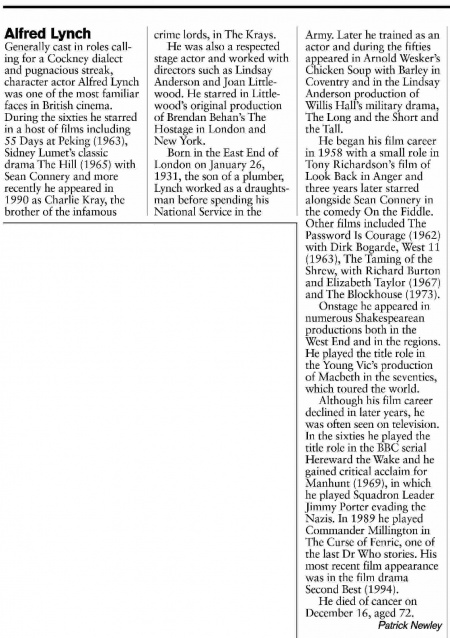Difference between revisions of "Alfred Lynch"
John Lavalie (talk | contribs) (Created page with "{{obit}}{{article | publication = The Stage | file = 2004-01-15 Stage.jpg | px = 450 | height = | width = | date = 2004-01-15 | author = Patrick Newley | pages = 22 | langua...") |
John Lavalie (talk | contribs) |
||
| Line 20: | Line 20: | ||
He was also a respected stage actor and worked with directors such as Lindsay Anderson and Joan Little-wood. He starred in Littlewood's original production of Brendan Behan's The Hostage in London and New York. | He was also a respected stage actor and worked with directors such as Lindsay Anderson and Joan Little-wood. He starred in Littlewood's original production of Brendan Behan's The Hostage in London and New York. | ||
| − | Born in the East End of London on January 26, 1931, the son of a plumbee Lynch worked as a draughtsman before spending his National Service in the | + | Born in the East End of London on January 26, 1931, the son of a plumbee Lynch worked as a draughtsman before spending his National Service in the Army. Later he trained as an actor and during the fifties appeared in Arnold Wesker's Chicken Soup with Barley in Coventry and in the Lindsay Anderson production of Willis Hall's military drama, The Long and the Short and the Tall. |
| − | |||
| − | Army. Later he trained as an actor and during the fifties appeared in Arnold Wesker's Chicken Soup with Barley in Coventry and in the Lindsay Anderson production of Willis Hall's military drama, The Long and the Short and the Tall. | ||
He began his film career in 1958 with a small role in Tony Richardson's film of Look Back in Anger and three years later starred alongside Sean Connery in the comedy On the Fiddle. Other films included The Password Is Courage (1962) with Dirk Bogarde, West 11 (1963), The Taming of the Shrew, with Richard Burton and Elizabeth Taylor (1967) and The Blockhouse (1973). | He began his film career in 1958 with a small role in Tony Richardson's film of Look Back in Anger and three years later starred alongside Sean Connery in the comedy On the Fiddle. Other films included The Password Is Courage (1962) with Dirk Bogarde, West 11 (1963), The Taming of the Shrew, with Richard Burton and Elizabeth Taylor (1967) and The Blockhouse (1973). | ||
Latest revision as of 23:28, 23 October 2018
- Publication: The Stage
- Date: 2004-01-15
- Author: Patrick Newley
- Page: 22
- Language: English
Generally cast in roles calling for a Cockney dialect and pugnacious streak, character actor Alfred Lynch was one of the most familiar faces in British cinema. During the sixties he starred in a host of films including 55 Days at Peking (1963), Sidney Lumet's classic drama The Hill (1965) with Sean Connery and more recently he appeared in 1990 as Charlie Kray, the brother of the infamous crime lords, in The Krays.
He was also a respected stage actor and worked with directors such as Lindsay Anderson and Joan Little-wood. He starred in Littlewood's original production of Brendan Behan's The Hostage in London and New York.
Born in the East End of London on January 26, 1931, the son of a plumbee Lynch worked as a draughtsman before spending his National Service in the Army. Later he trained as an actor and during the fifties appeared in Arnold Wesker's Chicken Soup with Barley in Coventry and in the Lindsay Anderson production of Willis Hall's military drama, The Long and the Short and the Tall.
He began his film career in 1958 with a small role in Tony Richardson's film of Look Back in Anger and three years later starred alongside Sean Connery in the comedy On the Fiddle. Other films included The Password Is Courage (1962) with Dirk Bogarde, West 11 (1963), The Taming of the Shrew, with Richard Burton and Elizabeth Taylor (1967) and The Blockhouse (1973).
Onstage he appeared in numerous Shakespearean productions both in the West End and in the regions. He played the title role in the Young Vic's production of Macbeth in the seventies, which toured the world.
Although his film career declined in later years, he was often seen on television. In the sixties he played the title role in the BBC serial Hereward the Wake and he gained critical acclaim for Manhunt (1969), in which he played Squadron Leader Jimmy Porter evading the Nazis. In 1989 he played Commander Millington in The Curse of Fenric, one of the last Dr Who stories. His most recent film appearance was in the film drama Second Best (1994).
He died of cancer on December 16, aged 72.
Disclaimer: These citations are created on-the-fly using primitive parsing techniques. You should double-check all citations. Send feedback to whovian@cuttingsarchive.org
- APA 6th ed.: Newley, Patrick (2004-01-15). Alfred Lynch. The Stage p. 22.
- MLA 7th ed.: Newley, Patrick. "Alfred Lynch." The Stage [add city] 2004-01-15, 22. Print.
- Chicago 15th ed.: Newley, Patrick. "Alfred Lynch." The Stage, edition, sec., 2004-01-15
- Turabian: Newley, Patrick. "Alfred Lynch." The Stage, 2004-01-15, section, 22 edition.
- Wikipedia (this article): <ref>{{cite news| title=Alfred Lynch | url=http://cuttingsarchive.org/index.php/Alfred_Lynch | work=The Stage | pages=22 | date=2004-01-15 | via=Doctor Who Cuttings Archive | accessdate=8 February 2026 }}</ref>
- Wikipedia (this page): <ref>{{cite web | title=Alfred Lynch | url=http://cuttingsarchive.org/index.php/Alfred_Lynch | work=Doctor Who Cuttings Archive | accessdate=8 February 2026}}</ref>
